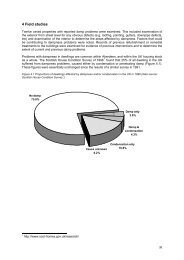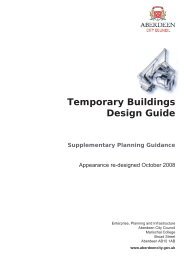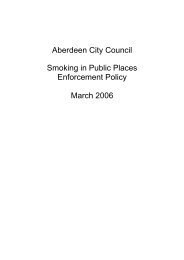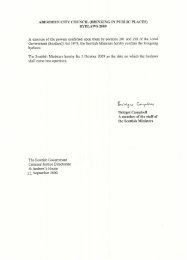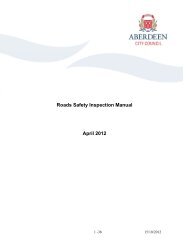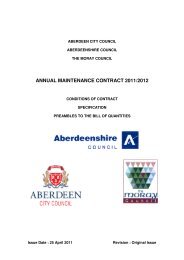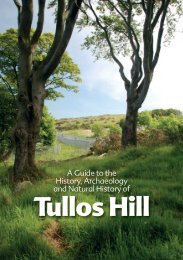he concept of the Burgess oath belongs - Aberdeen City Council
he concept of the Burgess oath belongs - Aberdeen City Council
he concept of the Burgess oath belongs - Aberdeen City Council
- No tags were found...
Create successful ePaper yourself
Turn your PDF publications into a flip-book with our unique Google optimized e-Paper software.
<strong>he</strong> hig<strong>he</strong>st honour that t<strong>he</strong> <strong>City</strong> <strong>of</strong><strong>Aberdeen</strong> can bestow is by grantingFreedom <strong>of</strong> t<strong>he</strong> <strong>City</strong> to anindividual or to an organisation, ashappened w<strong>he</strong>n t<strong>he</strong> local Regiment, t<strong>he</strong>Gordon Highlanders, and t<strong>he</strong> city’sadopted warship, HMS Scylla, weredeemed to merit such an honour.In recent decades those so admitted haveincluded Sir Winston Churchill, QueenElizabeth t<strong>he</strong> Queen Mot<strong>he</strong>r, MikhailGorbac<strong>he</strong>v, former President <strong>of</strong> Russia,and Sir Alex Ferguson, football manager,whose association with <strong>Aberdeen</strong>Football Club has passed into locallegend.To some general confusion, however,each was admitted not as a Freeman <strong>of</strong><strong>Aberdeen</strong> but as a Free <strong>Burgess</strong> andGuild Brot<strong>he</strong>r (or sister). AlthoughFreedom ceremonies are civic affairsand t<strong>he</strong> decision to admit a Free <strong>Burgess</strong>is taken by t<strong>he</strong> Town <strong>Council</strong>, t<strong>he</strong>honour thus conveyed takes its originfrom t<strong>he</strong> power and prestige <strong>of</strong> t<strong>he</strong>medieval Guildry.In t<strong>he</strong> time w<strong>he</strong>n overseas trading insimple and basic commodities was adriving force in Scotland’s quest foreconomic prosperity, admission withoutpayment to t<strong>he</strong> ranks <strong>of</strong> t<strong>he</strong> Guildry wasa privilege that few could dream <strong>of</strong>.From being a mark <strong>of</strong> gratitude to thosewho had served t<strong>he</strong> burgh faithfully insome particular project or capacity, freeadmission to t<strong>he</strong> ranks <strong>of</strong> Guild<strong>Burgess</strong>es rapidly became one <strong>of</strong> esteemand a means by which t<strong>he</strong> Town <strong>Council</strong>strove to win friends and to exerciseinfluence.T<strong>he</strong> first recorded admission as anHonorary <strong>Burgess</strong> is that <strong>of</strong> Robert deErskyne, Earl <strong>of</strong> Mar, whose entry in t<strong>he</strong><strong>Council</strong> Register <strong>of</strong> 28 December 1439reads that <strong>he</strong> is not bound to Scot andlot, watch and ward, responsibilitiescustomarily laid upon <strong>Burgess</strong>es. In1451, Andrew Fowler was admitted as aFree <strong>Burgess</strong> in return for repairing t<strong>he</strong>bell <strong>of</strong> St Nicholas Church. He,however, was expected to takeresponsibility for Scot and lot, watchand ward.Over time, t<strong>he</strong> convention developedthat honourands - those who, in atranslation <strong>of</strong> t<strong>he</strong> ornate Latin <strong>of</strong> t<strong>he</strong>Register, were admitted in token <strong>of</strong> t<strong>he</strong>most devoted love and affection and <strong>of</strong>t<strong>he</strong> most distinguis<strong>he</strong>d respect - did nottake t<strong>he</strong> <strong>Burgess</strong> <strong>oath</strong>.



